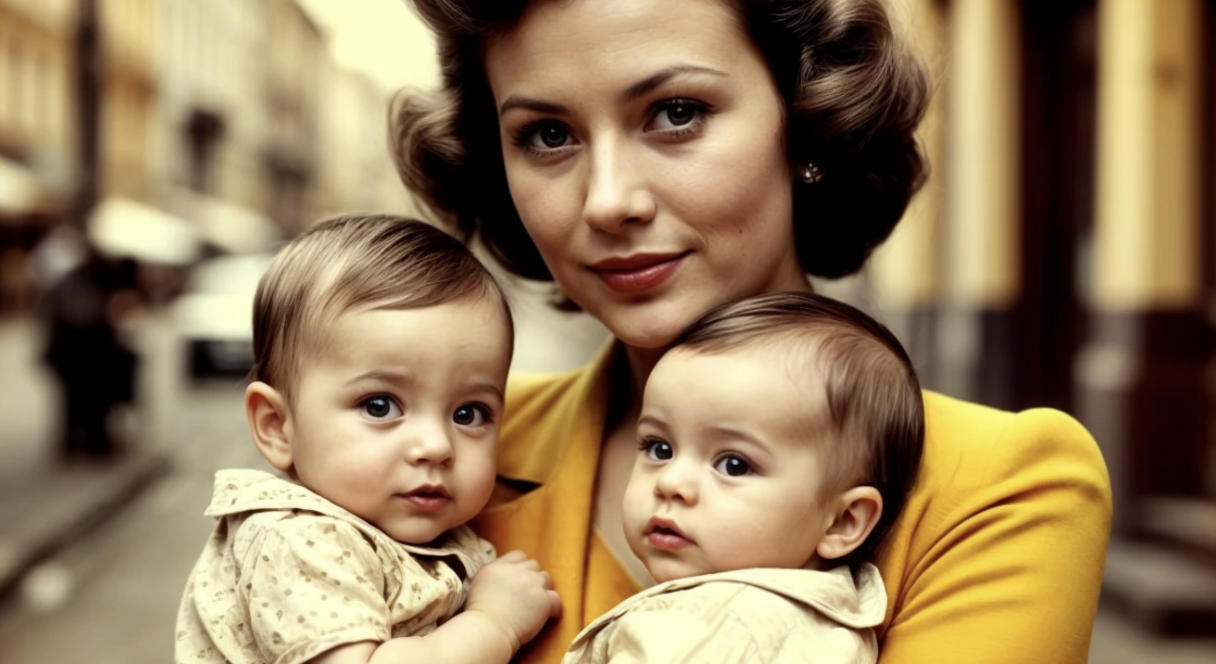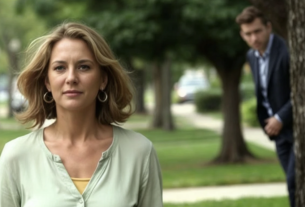Varya woke up to the noise coming from the street. Outside the window, the weather was hot and summery; a heavy heat hung in the air, wrapping everything around like a thick blanket. The nurse, noticing that the patient had awakened, slightly opened the window vent, letting a rare gust of fresh air into the room. Varya slowly and carefully lifted her head — her muscles were stiff after many days of lying down, and her body felt foreign and uncooperative. She looked out the window and saw that at the entrance of the women’s clinic, a mother was being discharged with two infants. A whole delegation of relatives greeted them — joyful faces, flowers, smiles. In the center of this happy bustle stood a young man holding huge blue balloons that fluttered cheerfully in the light breeze.
“So, boys…” Varya thought to herself, and her eyes involuntarily filled with tears. Not tears of joy or sadness, but a strange mixture of feelings she could not name. These were tears of memories, pain, hope, and fear.
Once again, she found herself back there, in that nightmare that had accompanied her the past few months. The events flooded her mind with such force, as if everything had happened only yesterday.
Not long ago, Varya had been happy. Radiant, full of life, she learned she was pregnant. This news was a true gift from fate. That evening at dinner, she shared it with trembling excitement with her husband, Stas. He did not hide his joy — his face literally glowed with happiness. They were newlyweds, having only recently bound themselves in marriage, but they loved each other as if they had known each other their whole lives.
Varya immediately made an appointment and began to take care of her health. Every day was special, filled with anticipation and excitement. They went together for the first ultrasound, holding hands like children going to an amusement park. But instead of the magical image of a tiny beating heart inside, they heard words that turned their world upside down.
The diagnosis was cruel and merciless. The doctor spoke for a long time, using medical terms that sounded like foreign spells. At the end of her explanation came a phrase that stayed with Varya the most:
“In your case, it’s better to have an abortion. The diagnosis is incompatible with life.”
Stas turned pale. Varya did not cry. She simply stared ahead, unable to understand how this was possible. How can something that hasn’t even fully become real be “incompatible”?
“But how did this happen?” he asked, trying to keep his composure.
The doctor just shrugged indifferently and continued explaining as if talking not about a human life, but about some technical malfunction.
Varya demanded repeat tests, a specialist panel, additional examinations. She wanted to believe it was a mistake, a coincidence, a blunder. But the answer remained unchanged. The only additional advice from the doctors was to do an amniocentesis to confirm the diagnosis.
She agreed. What else was there to do? Only pain and fear. A few days later, the results confirmed the worst fears. Again, she was advised to terminate the pregnancy.
Varya was admitted to the hospital. Everything happened like in a dream. As if someone else was making decisions, signing papers, lying down on the operating table. She requested general anesthesia — she didn’t want to see anything, hear a single sound, or feel a thing.
“It’s over,” she whispered to herself when she was finally alone. Then, burying her face in the blanket, she quietly cried into her pillow until her tears dried.**
Two days later, Stas took her home. He was worried — the old Varya no longer existed. Before him stood a shadow of the woman he loved. She moved mechanically, her gaze was dull, her voice barely audible. He hugged her tightly, ran his hand through her hair, trying to bring back warmth and confidence.
“Varya, I’m with you. I love you. Everything will be alright,” he whispered, not even knowing if he believed those words himself.
“No, Stas… nothing will ever be alright,” she answered, burying her face in his shoulder, and cried again.**
A year passed. Time doesn’t heal but helps a bit to distance from the pain. Varya threw herself into work, trying not to think, not to remember. Sometimes she stayed late, came home close to dawn. Work became a lifeline, though sometimes she felt that this shell was beginning to press down on her.
Suddenly, Stas suggested they go visit his parents in the village. It would take several hours by train. Varya didn’t object — a change of scenery wouldn’t hurt. Stas hoped fresh air, nature, and the care of family would help his wife relax a little, to remember what it meant to be a living person, not a shadow of the past.
“We’ll walk through the forest, swim in the river, visit my parents,” he persuaded her, trying hard to lift her spirits.
On Friday evening, Stas met Varya after work, and they headed straight to the train station. The train was already arriving when they got to the platform. Stas ran to get the tickets while Varya waited near the carriage. At that moment, a gypsy woman suddenly approached her. Her eyes burned, her voice was confident and somewhat mysterious:
“You will give birth to twins on your birthday.”
And before Varya could say anything, the woman disappeared, as if dissolved into the air, leaving only a shadow of puzzlement and anxiety behind.
A minute later, Stas came over.
“Varya, what’s wrong? You’re shaking.”
“Nothing… I just thought I saw something… Did you get the tickets?”
“Yes, let’s get on the train.”
The gypsy woman wouldn’t leave Varya’s mind. Thoughts swirled like leaves in an autumn wind. When the train started moving, she gathered courage and asked:
“Stas, did you see a gypsy woman when you came to me?”
“No, there was no one,” he replied firmly.
“Maybe I really imagined it…” she muttered, trying to convince herself too.
In the village, it did become easier. Fresh air, a cozy little house, the care of elders — all this gradually began to soften the pain. For the first time in many months, Varya had a strange dream: she held two large fish in her hands. In the morning, she didn’t immediately understand the meaning of this image but, while having breakfast, she asked her mother-in-law:
“Maria Ivanovna, what does it mean to dream about fish? I dreamed I was holding two.”
“Varyusha, it means pregnancy!” the woman exclaimed happily.
“Oh, don’t pay attention to it,” Varya tried to brush it off.
“You’ll soon give me grandchildren,” Maria Ivanovna smiled, clearly believing her own words.
“Do you believe in dreams?” Varya still doubted.
“Whether you believe or not, fish always mean pregnancy. It’s a sign,” she answered confidently.
A month later, Varya missed her period. At first, she didn’t pay attention — stress, fatigue, change of climate… But after a couple of days, she felt weak and nauseous. Memories of the past flared up, but now with new hope. She bought a test at the pharmacy, came home, and without undressing went to the bathroom. Two lines. Clear, bright, leaving no doubt.
Running out, she bumped into Stas who was just entering the apartment.
“Stas! I’m pregnant!”
“Varya… I’m so happy. I love you,” he admitted, hugging his wife and kissing her tightly.**
That night, Varya fell asleep in the arms of her beloved, happy and confident that everything would be different. And indeed — everything went differently.
At the appointment, the doctor confirmed the pregnancy and added one important detail:
“You will have twins.”
“Twins?” Varya couldn’t believe her ears.
“Yes,” the doctor smiled.
It was a sign. A sign that life was not over. That pain could be overcome. That there was room for a second chance.
All tests were normal. The doctor only recommended bed rest during the last month to minimize risks. But Varya felt great. And on her birthday, loud, healthy, life-filled cries were heard in the delivery room.
Two boys, resembling their father, were born that very day.
And today, on the steps of the maternity hospital, stood that same happy father with huge blue balloons, a bouquet of flowers, and gifts for the medical staff. Stas was waiting for his Varya, his sons.
Once, while walking with a stroller in the yard, Varya saw that same gypsy woman again. She approached silently, like a shadow, and said:
“Well, you gave birth to twins on your birthday?”
Varya nodded, smiling through her tears.
“Yes.”
The gypsy woman disappeared just as suddenly as she had appeared. Only the wind remained, playing with the petals of spring flowers, and two small hearts beating next to her own.



